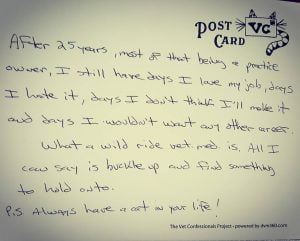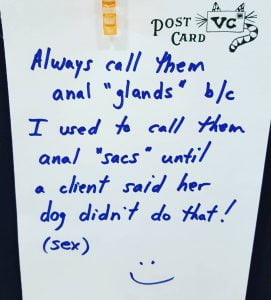I’ve just been reading the Facebook page of the Veterinary Confessionals Project. It is eye opening. It is enlightening and I would advise others to read the page. I confess that I have on occasions been too harsh on veterinarians. I have felt the same feelings that many others have felt. Sometimes, we feel that veterinarians are too greedy. Using Google, I can tell that some people feel that veterinarians are even worse than greedy, they feel that they are crooks or scammers – hence the title.
It is a complicated subject. We should not generalise. And here is the first problem: clients of veterinarians and the general public can tend to generalise about veterinarians. You can’t state that veterinarians are scammers because in making that statement you are saying that all veterinarians are scammers and crooks. That is positively not the case.
No doubt there are some veterinarians who have prioritised to an excessive extent profit over animal welfare but I’m sure that these examples are quite rare. Also, I would suggest that when big business becomes involved in veterinary practices and operate a chain of clinics, there is a greater tendency to be greedy because the operation is run by businessmen and accountants. This is in contrast to independent veterinary clinics which are owned and operated by the veterinarians themselves.
But it has come to light, although it must be known for a long time amongst veterinarians, that there is a high rate of suicide among veterinarians. Research is being done on why this should be the case. Having skimmed through the Veterinary Confessionals Project there are no doubt many reasons why veterinarians may become suicidal but one of them would be PTSD. Dealing with sick and injured animals and their death must be traumatic. The situation can also be compounded by ungrateful clients who demand the impossible sometimes.
In addition, there would appear to be a problem in some veterinary clinics with respect to the management of veterinarians and support staff by senior veterinarians. Not only does a junior veterinarian have to deal with the stresses and strains of dealing with sick and injured animals and their owners, they have to deal with their bosses as well. It would seem that some (not sure how prevalent this is) senior veterinarians are not providing enough support to trainees and associates. They appear to be putting junior staff through the same sort of difficulties that they themselves went through when they should be doing their best to alleviate these difficulties through excellent management and on-the-job training.
Other stressors for veterinarians would be long hours and dealing with ethical dilemmas. Then there must be the usual mistakes that veterinarians make which can prey on their minds. This is a very responsible job because dealing with someone’s pet is almost like dealing with a member of the client’s family. It is like treating a person. Arguably, veterinarians are not paid enough bearing in mind the high level of responsibility. In addition, veterinarians acquire a large debt accrued during training which has to be paid off. This financial burden must be taken into account when assessing whether a veterinarian is greedy or not.
Notwithstanding the stresses and strains of being a veterinarian there are some light moments and the Veterinary Confessional Project have a nice idea which is to let veterinarians and veterinary technicians and other support staff to confess to some of the amusing things that have occurred during their work by writing it down on a card. The cards are then posted on a board at conferences.
Presented on this page are some of those cards. Also, I have published an extract from a book which points to the vulnerability of your veterinarian as a person (as all people, arguably, are). Perhaps we demand too much of them. We think they can fix things – all health problems – as if we’re walking into a shop and buying something. Veterinary work is not like that quite obviously.
There is one interesting card from a senior veterinarian who has run his practice for a long time. He feels even after that time that he is an impostor. He feels that he shouldn’t be in the job because he is not good enough, it seems to me. I am certain that he is a very good veterinarian. Perhaps he feels undervalued. Perhaps he is too self-critical. Perhaps his clients have driven him to this attitude.
The Veterinary Confessional Project indicates to me that the clients of veterinarians can be too tough, impolite and ungrateful. Clearly not all clients are like that and once again we should not generalise but there would seem to be a minority of clients who don’t appreciate the service with which they are provided. For example, one receptionist and veterinary technician complains that she is not believed by clients but when a veterinarian says exactly the same thing they believe it.
I think I have made my point. We should not be too hard on veterinarians. They have to make a living. They have to run clinics and make a profit. They have to pay support staff and receptionist and so on. There must be countless overheads. These are all pressures; business pressures to which you have to add the pressures of dealing with the public and the stresses and strains of dealing with sick, injured and dying animals who are often treated as family members by their clients. It’s a difficult job. Some veterinarians have not done themselves a favour by, for example, over vaccinating and over testing or overprescribing but I sense, from this Facebook page, that the majority of veterinarians are decent people.
For me, however, there is one issue which I cannot reconcile with the veterinary profession in America and which I can’t run away from on this page even if it is critical of vets. I am not alone in this but I know that many people will disagree with me. I’m referring to that tricky and provocative subject which polarises people: the declawing cats. The vast majority, if not almost all veterinarians in America declaw cats. That in itself is a terrible indictment of the attitude of veterinarians. It really has to stop. It truly does because it undermines their profession dramatically. I know that I am going to bore people but it is against their oath, it is unnecessary, it looks as if the veterinarian is greedy, a lot of the operations are carried out badly, many cats are in a lot of pain, many cats suffer behavioural issues because of the operation (although many cats get through it reasonably well) and so on. Why does the profession carry out this operation? The amount of money they make from declawing is far outweighed by the way it undermines their profession and presents to the public the wrong image. Stop declawing and you will find that veterinarians are less stressed, more confident about their status in society, more loved and in a much better place.
P.S. The points raise here refer to vets in the USA but I am sure that vets in other countries have similar or identical issues to deal with.
P.P.S. Link to Veterinary Confessional Project FB page.










I have had many encounters with veterinarians. The most recent was when my dog had keratinous paws. I had just got his nails trimmed and 3 days later he was lying next to me, and I started rubbing his paw pads. To my shock and surprise all this debris started falling off his paws. They were like chunks of little rocks. I gathered them up in a bag and when I told my veterinarian about it, I was expecting them to reschedule me and treat the problem. Instead, the vet refused to ever see me again and referred me to a different vet. I took my dog to the new vet yesterday. I told her about the previous vet experience and showed her the picture of the debris off my dog paws and to my shock she said, “they won’t hurt anything.” The new vet didn’t even look or touch my dog’s paws. She was just like the former vet who charged $79. for 15 minutes and didn’t even touch my dog. I also had asked if my senior dog had cataracts and my question was not even addressed. Hyperkeratosis is a condition that can get worse if left untreated.
Thanks for sharing your thoughts Charles.
Every Veterinarian I have encountered. Does not care about Cats. A Vet can intentionally kill your pet & tell the owner “sorry we did ore best, she or he didn’t make it. That Veterinarian still gets paid the full amount as a Vet saved the pets life.
I upset this veterinary confessional one day by sharing a post of theirs and giving my view. The vet posted he/she was pretty much suicidal and my comment was to the nature that I sure wouldn’t want someone like that in charge of my pets life. I violated their safe space and because I didn’t feel like squabbling I took the post down as requested. I regret doing that. Mentally unstable people have no right to be touching our pets. The people around these mental cases protect them. I have now had two out of the blue conversations about my bad vet and her issues. Everyone involved and working at the clinic knew/knows she has a problem and not one of them done a stinking thing. And that’s why I have a box of ashes where I should have my beautiful Kitten enjoying her senior years. I see this FB page as a warning to all pet owners. I consider every person employed in her office scum along with all of her friends.
The title of this article should be “Veterinarians Are Greedy, Crooks and Scammers. Yes
http://www.facebook.com/regretavetveterinarynegligence